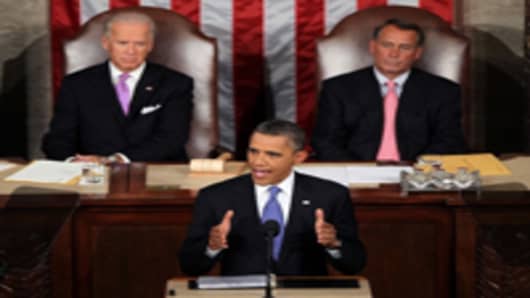“We should pass this jobs plan right away,” said President Barack Obama as he addressed America and Congress, calling for an end to the political circus in Washington and action that would “actually help the economy.” With those words, the president threw down the gauntlet to his Republican opponents with a $447 billion dollar stimulus package aimed at boosting jobs before America goes to the polls late next year.
The bulk of the plan is made up of tax cuts for workers and businesses and infrastructure spending.
Analysts are divided on whether the plan will actually work, although it did beat the street in terms of its scale.
“While all indications going into Obama's jobs speech were that the size of the package would be around $300 billion, it seems that it was just the spin doctors lowering expectations,” said economist Rudy Narvas of Societe Generale following the speech.
The risks to U.S. growth estimates, according to Narvas, are now to the upside.
The political risks, however, are to the downside.
“Given what we have seen in Washington over the past year, the chance of the whole package passing Congress is very slim,” Narvas said.
“Getting Republicans to agree to most of the spending programs will prove to be very difficult.
As a result, a more realistic scenario would be a package that is a combination of the payroll tax cuts and the extension of unemployment insurance benefits,” said Narvas, who thinks the final package will actually be worth between $180 billion and $300 billion.
Mohamed El-Erian, chief executive officer of Pacific Investment Management Co. (Pimco), believes the speech could be a "Sputnik moment." “The Administration has at long last recognized the severity of America's unemployment crisisand the need for a comprehensive policy response,” El-Erian wrote in a guest blog for CNBC.com.
The man who helps run the world’s biggest fund management firm is calling on the members of Washington's political class not to let their own interests get in the way of a positive deal.
“Democrats and Republicans now have a choice. They can either coalesce around the president's program, drawing comfort from individual elements that appeal to them; or they can hold out for more and, in the process, turn the pursuit of their personal best into an enemy of the public good,” said El-Erian.
“At long last, President Obama did enough this evening to upgrade the quality of the nation's economic debate. He presented a credible program that is focused on the right structural areas. Now he must strengthen it and complement it with a sensible fiscal component; and Congress must discuss it in a cooperative and constructive manner,” said El-Erian.
Others are not as convinced about the merits of the jobs plan.
“We need a bigger package,” Michael Yoshikami, the chief executive officer and founder of YCMNET Advisors, said in an interview with CNBC on Friday.
“Bernanke has all the firepower, and investors are looking for action. There have been so many words, so much talk. The market will only react when they get tangible from the Fed,” said Yoshikami.
“The politicians have cried wolf so often that people just don’t want to listen to them any more.”



